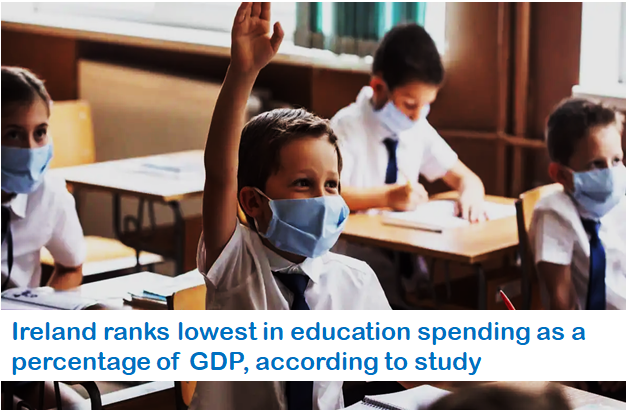In a recent international study conducted, Ireland has emerged with a distinct approach to education expenditure. While the report highlights that Ireland allocates a lower percentage of its Gross Domestic Product (GDP) to education than most developed countries OECD reports, it raises an intriguing observation.
Ireland’s allocation towards education in terms of GDP was recorded at 3.2 percent in 2020, placing the country at the bottom of the rankings among 38 nations. This figure contrasts significantly with the OECD’s average of nearly 5 percent.
However, the report delves deeper into the factors influencing these numbers. It points out that Ireland’s GDP may be somewhat inflated due to the significant presence of tech companies that have chosen Ireland as their legal headquarters for “tax purposes.” This peculiarity impacts the GDP figure but may not fully represent the country’s educational commitment.
When considering education spending as a proportion of the state’s overall expenditure, Ireland’s approach takes on a different dimension. The study reveals that Ireland dedicates 12 percent of its state expenditure to education, surpassing the OECD average of 10 percent.
The recently released Organisation for Economic Co-operation and Development (OECD) Education at a Glance report for 2023 sheds light on Ireland’s distinctive position concerning teacher salaries and working conditions compared to other developed nations.
OECD member states, including most of Europe, the United States, Canada, Korea, Israel, and Australia, were part of this comprehensive study.
One standout revelation from the report is that Ireland boasts higher average salaries for teachers than the majority of developed countries. When adjusted for purchasing power, the report shows that Ireland’s primary school teachers earned an average of $58,149 (€62,420), surpassing the OECD average of $48,023. Secondary school teachers in Ireland also enjoyed higher-than-average salaries, with an average of $60,112, compared to the OECD’s secondary teacher average of $53,119.
Remarkably, Ireland’s teacher salaries were found to be outpaced only by a handful of countries, including Germany, Austria, Australia, Denmark, the Netherlands, and the United States.
It also highlighted that Ireland’s teachers face longer compulsory instruction times and larger class sizes compared to the OECD average.
One noteworthy development is the positive trend in pupil-teacher ratios. Ireland has been taking steps to enhance the supply of teachers and has implemented policies aimed at reducing class sizes, particularly at the primary level. These efforts have yielded improvements in pupil-teacher ratios, indicating a commitment to enhancing the quality of education.
Another significant aspect highlighted in the report is Ireland’s exemplary school completion rates. Ireland stands out with one of the highest rates of students successfully completing their second-level education. While the OECD average shows that 14 percent of 25- to 34-year-olds did not finish their education, this rate is notably lower in Ireland, standing at just 5 percent. This achievement places Ireland among the few countries with “near universal” school completion, reflecting the country’s dedication to fostering educational success.
These high school completion rates in Ireland also have a positive impact on the proportion of young people not engaged in education, employment, or training. Across the OECD, nearly 15 percent of young adults are in this category, while in Ireland, it is significantly lower at 9 percent. Addressing this challenge is crucial, as it can have implications for future labour market outcomes.
Ireland also shines in the realm of further and higher education qualifications. The report reveals that a remarkable 54 percent of 25- to 64-year-olds in Ireland possess tertiary-level qualifications. This percentage surpasses the OECD average of 33 percent and is the highest in Europe, trailing behind only Canada and Japan. Ireland’s commitment to higher education is evident in these statistics.
However, the report does raise concerns in the area of childcare. It notes that Ireland is among a select group of countries where per-child expenditure on early childhood education has declined in recent years, warranting attention to ensure the continued quality and accessibility of early education.
The recently published OECD Education at a Glance report for 2023 emphasises the critical role of vocational education and training (VET) in equipping learners with practical skills, enhancing employability, and addressing the labour market’s demand for skilled professionals. It underscores that VET should be viewed as a valuable alternative to traditional academic pathways.
However, the report highlights a prevailing perception issue in many countries. Vocational programmes are often perceived as a “last resort” for students who face academic challenges or lack motivation, rather than being recognised as a first-choice option leading to promising and fulfilling career opportunities.
Irish Samachar English News
Kindly click the link below to join WhatsApp group chat to get important news and breaking news from Irish Samachar.


Comments are closed.